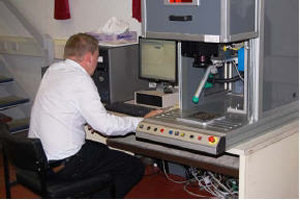Have a laser for breakfast
23 Feb 2011
A breakfast briefing featuring live laser demonstrations from University of Manchester academics is taking place next week.

The technology workshop, organised jointly with The University of Liverpool, will focus on surface treatments and marking applications.
Surface treatments are the up and coming technology for laser systems – such as texturing making man-made materials as smooth and water resistant as a water lily, coating applications with a 100% improvement in material efficiency compared to traditional methods, and metallic addition where a metal structure can be rebuilt or extended by the addition of fused metallic powders.
Laser marking is an application growing in popularity for non paint – Indelible, but minimally intrusive labelling of industrial or consumer components from biscuits to keyboards.
Laser marking will be illustrated by the live marking of a sample item individually related to attending delegates.
The breakfast takes place on Friday 4th March at the Clayton Conference Centre, juts off junction 7 of the M65 near Accrington. The free event starts at 8am and will finish by 10am.
Among the reasons for the event is to promote the Knowledge Exchange in Laser Engineering programme (KE-LAS) at the University.
This programme promotes the use of high technology laser systems in the North West and is financed by the North West Development Agency using European Regional Development Fund monies.
Roger Hardacre, The University of Manchester’s KE-LAS Business Development Manager, describes its benefits to companies in the North West.
He added: “Small to medium sized firms, wondering if new laser technologies would benefit their business, can use the programme for a free feasibility study, including pilot tests.
“Companies dealing with all forms of materials, metals, glass, ceramics, plastics, textiles can all use lasers for new and competitive enhancing applications.
“Then, if they want to implement a new laser system, we can help them design a bespoke project that could even be part funded with up to a 65% grant from the national Knowledge Transfer Partnership programme.
“It’s a low risk way to consider and bring in new competitive technology that will improve a company’s manufacturing process.”
